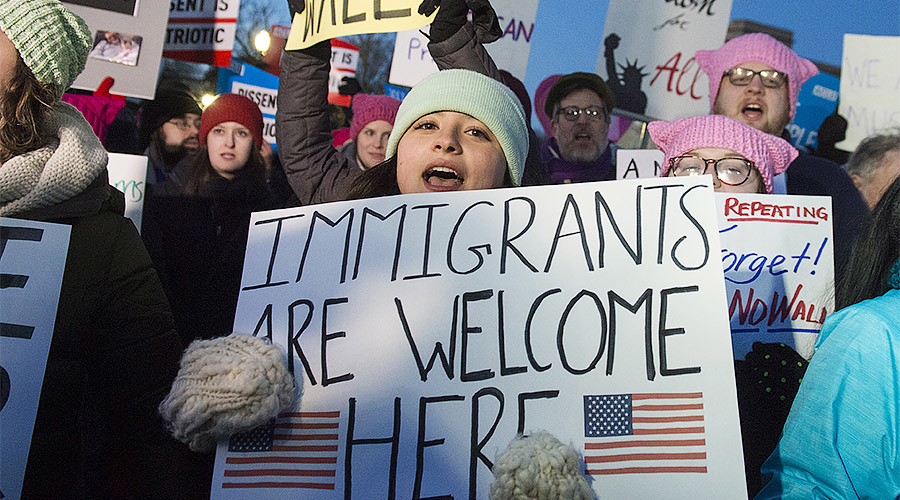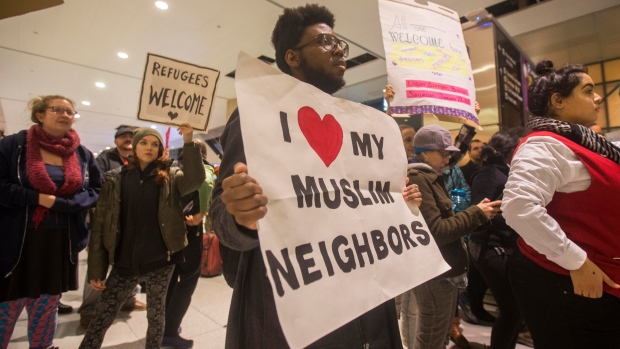
Donald Trump’s Travel-ban, which was first issued in January 2017, was a blessing in disguise for many, who perhaps would have ended in similar situation to those kids on the southern border. It is written in the Atlantic (June 19, 2018) that when the children are separated from their parents, they’re sent to facilities where they are kept in chain-link pens they can’t leave. The piece in the Atlantic asks, “But are those cages? It depends on whom you ask.” In effect, it is irrelevant, and should not have been the focal point whether these were cages or not, the focal point should have always been the process of separation and the act of separation of these kids from their parents. Soon after the debate became heavily focused on the conditions within which the kids lived, the primary issue, or in effect, the primary crime of their separations from their parents was no longer the point.
The Travel Ban stories were similarly constructed. Googling ‘Trump travel ban’, there are repeated stories about a Somali restaurant worker, who could not bring his father, or an Iranian pregnant woman could not bring her mother to America to help her with the baby. Another story in Michigan about a Yemeni-American father and U.S. citizen who committed suicide after his wife and two of his five children in Djibouti were denied visas to join him in the U.S. The stories emerging about these families, the way they are displayed and dramatized, overshadows all tragedies Muslims have endured sine 9/11. Even William Shakespeare would not have thought of such way of dramatizing the simple and obvious- why would one make ‘a hell’ of story about a pregnant woman trying to bring her mother to help her with the baby? Or why would one consider to humanize a man who committed suicide because his wife and two of his five kids were unable to leave Djibouti and to join him in Michigan? There are perhaps more happy people in Djibouti than in Michigan. At least in Djibouti, you could still have a drink in bar and you won’t get shot. That this man killed himself! In effect, with the current trend of the American domestic politics, you may find Americans moving to Djibouti.
The U.S. Supreme Court did partially approve that the Travel Ban is not against “foreign nationals who have a credible claim of a bona fide relationship with a person or entity in the United States.” So, in brief, all are allowed to enter except those from the countries the ban assigned who seek vacation in the United States, and refugees. Well, the issue of refugees is clear. No refuges are allowed in. With regards to vacation, or, say, holiday. The countries to which the ban applies are, in ‘Alpha-battle’ order, Iran; Libya, Somalia, Sudan, Syria, and Yemen. Most of the people living in these countries are currently busy fighting. They have no time for vacation, or holiday. Iraq however was dropped from the first version of the ban, due the protest from the Iraqi leadership that “we were fine, we had good life, we had enough resources, and we even had electric escalators on the public streets in Baghdad before you invaded our country.” With regards to all other countries, I doubt it that anyone could ever think of a vacation in the United States, and if so, those who could afford a vacation are no longer residents of those countries. Take Syria for example, even president Bashar Assad would not want to have holiday in the United States!
A good analysis of the decision of the Court on the Ban is written by Jonathan Blitzer in the New Yorker). His take on this is that the Ban effectively ineffective. He writes: So whom, exactly, will the travel ban now bar from the country? Blitzer asks Becca Heller, the director of the International Refugee Assistance Project, “It would have to be someone seeking a tourist visa from one of the six countries, who knows no one in the U.S., and who has no reason to be in the U.S. except for vacation.” The only people the Justices identified as being subject to the travel ban were foreign nationals with no ties to the United States. “There are no such people represented in the cases before the Court.” Yet, Trump celebrated the ban and considered it to be a victory for America’s national security.
What will happen to the Travel Ban when Biden is in the Oval Office? In effect, even if Biden goes on annul the Ban, American Muslims would still be facing the same problems, major of which, as stands, that some of Muslims living in the United States, are from Somalia, or Yemen, or say, Syria. These places are not New Zealand or Norway. I attempt to make the reader infer conclusions. As reported on Time (December, 1), the problem is as Khaled Beydoun, a law professor at Wayne State University, observes “only [to] understanding Islamophobia through the Muslim ban” and Professor Beydoun remains skeptical about just how much Biden will do to root out systemic Islamophobia.
The stories related to the Ban are similar to the ‘cages’ stories. It is not a ban, in effect, yes, it is not a ban. It is rather an ideological divide, which is part of a wider divide and discord currently existing in the United States. Perhaps, some of the Muslims living in the United States are better off than say, Gretchen Whitmer, the governor of Michigan, who was supposed to be kidnapped and executed. While there is a widespread and established Islamophobia in the United States, the Biden administration can do little about it. Biden’s diverse cabinet will be a reason for more radicalism in the United States rather than a demonstration of an immediate beautiful future for Americans. A 75 Million voters for Trump won’t go back home and embrace diversity. Thus, the stories about the Ban remain irrelevant, if not tiresome. America is suffering, not only American Muslims.
Nath Aldalala’a , Shandong University, China
SIGN UP FOR COUNTERCURRENTS DAILY NEWSLETTER













































